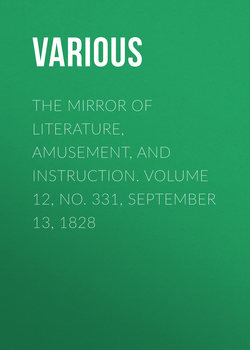The Mirror of Literature, Amusement, and Instruction. Volume 12, No. 331, September 13, 1828

Реклама. ООО «ЛитРес», ИНН: 7719571260.
Оглавление
Various. The Mirror of Literature, Amusement, and Instruction. Volume 12, No. 331, September 13, 1828
CHARLECOTE HALL, NEAR STRATFORD-UPON-AVON
ON NATIONAL VARIETIES
NOTES OF A READER
THE SKETCH BOOK
SPIRIT OF DISCOVERY
SPIRIT OF THE PUBLIC JOURNALS
THE GATHERER
Отрывок из книги
There are few more familiar subjects than that of the varieties of national character, and the resemblances and differences that exist between ourselves and the inhabitants of other countries. Few conversations occur upon circumstances which may have happened abroad, in which some one has not an anecdote to relate to illustrate the known peculiarities of the nation in question; and the greater part of the travels and tours which now issue in such formidable numbers from the press, are naturally filled with stories and incidents, either to show the correctness of our ideas of the manners and opinions of our neighbours, or (perhaps more frequently) to prove that the public were in error in that respect, up to the time when the traveller in question had discovered the truth, or a clue to it. The daily accounts of the outrages perpetrated in Ireland, and the alarms that are sounded ever and anon, touching the state of that unhappy country, are continually exciting surprise, that the natives of the sister island should be so unaccountably deficient in that sense of order and sobriety which prevails in Great Britain. We associate with a Scotchman the ideas of shrewdness and prudence; with a Frenchman, gaiety and frivolity; with a Spaniard, gravity and pride; with an Italian, strong passions of love and revenge: with a German, plodding industry and habits of deep thinking; and with the northern nations, an honest sincerity and persevering courage. We sometimes judge with tolerable correctness; at others are wholly mistaken, and not unfrequently run into such extremes, that having established a principle, that a particular people are knavish, or cowardly, or stupid, we are unwilling to admit any exceptions, but include the whole race in our sweeping censure. We are prejudiced at first sight against a Portuguese or Italian, and are careful of our communications with him, even though we meet him on the high road, or by mere accident in a public place. There can, however, be no mistake in the common notion, that each nation has a peculiar collection of qualities and habits, distinguishing it in a greater or less degree from its neighbours, and the rest of the world; and it is, therefore, at all events, an interesting, if not an useful topic, to reflect a little how these differences arise. Not that we intend here to give even any particular description of the various races of mankind, or to enter into any inquiry upon the degrees of their mental and bodily capacities; such would be foreign to our purpose, and would exceed our limits. We shall merely hazard a few observations upon the several causes to which the diversities in men have been referred, not pretending to any decided opinion on so nice a point, as whether these causes are wholly of a physical or of a moral kind, or whether they are compounded of both. The question is, perhaps, one of the most difficult in the whole range of philosophical experience; we say experience, because it is obvious that all theory on the subject must be the result of observation and analysis; and that no general principles can be laid down in the first instance, as the ground work of any hypothesis we might be inclined to frame.
The scientific men to whom we are chiefly indebted for the facts accumulated on this subject, are Dr. Blumenbach, of Göttingen, Dr. Pritchard, of Edinburgh, and the eminent surgeon, Mr. Lawrence. It has been a favourite matter of speculation with Lord Monboddo, as well as with Voltaire, Rousseau, and the philosophers of the French school, who have endeavoured to show that men and other animals are endowed with reason or instinct of the same kind, but of different degrees. According to these fanciful writers, the monkey is but another species of the human race, and has been termed by them Homo Sylvestris. They made the most diligent researches into all accounts concerning men in a savage state, and were delighted beyond measure with the discovery alleged to have been made in the island of Sumatra, of men with tails regularly protruding from their hinder parts, who, according to Buffon, walked and talked in the woods like other gentlemen:—
.....
The American family has a dark skin, a red tint, straight hair, a small beard, low forehead, and broad face. It includes all the American tribes, except the Esquimaux.
The Malay family is brown, varying from a light tint to black. Their hair is black and curled, head narrow, bones of the face prominent, nose broad, and mouth large. They inhabit Malacca, Sumatra, Java, and the adjacent islands; Molucca, the Ladrones, New Holland, Van Dieman's Land, New Guinea, New Zealand, and the South Sea Islands. They speak generally the Malay language.
.....